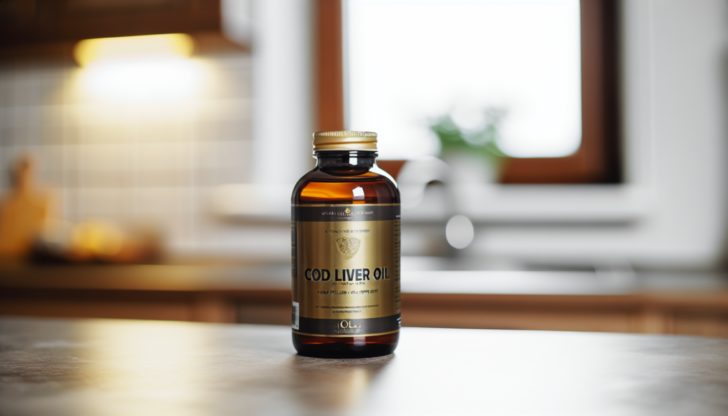In our quest for holistic health and nutrition, we often turn to supplements to fill the gaps left by our regular diets. One such superstar supplement is cod liver oil, derived from the liver of Atlantic cod. Packed with essential nutrients like Omega-3 fatty acids and vitamins A and D, cod liver oil is a powerhouse of health benefits. But how does it stack up against other fish oils? Let’s find out!
Table of Contents
Key Takeaways
Cod liver oil is a powerful dietary supplement that provides numerous health benefits due to its high content of omega-3 fatty acids, vitamin D, and vitamin A.
It is recommended to consult a healthcare professional before taking cod liver oil for optimal symptom relief and safety.
When selecting a cod liver oil supplement, look for one tested by reputable third parties with accurately labeled ingredients and dosages.
The Power of Cod Liver Oil

Dietary cod liver oil, extracted from the liver of Atlantic cod, boasts an impressive nutrient profile. Consuming it supplies key nutrients beneficial for cardiovascular, hormonal, immune, reproductive, and neurological health. The key components contributing to its beneficial health effects are eicosapentaenoic acid (EPA) and docosahexaenoic acid (DHA), both forms of omega-3 polyunsaturated fatty acids (PUFAs), along with vitamin D and vitamin A.
These nutrients interact synergistically to offer a multitude of health benefits. They help in inflammation reduction, support cardiovascular health, promote cognitive function, reinforce the immune system, and contribute to skin and bone health. Cod liver oil use has also been associated with enhanced brain function and a reduced risk of depressive symptoms, thanks to its abundant omega-3 fatty acids and vitamin D content.
Omega-3 Fatty Acids

Omega-3 fatty acids, plentiful in cod liver oil, are crucial for maintaining health. They work to decrease inflammation by reducing the levels of inflammatory cytokines in the bloodstream. This helps to rebalance the fatty acid ratio, promoting health by mitigating inflammation, which is often the underlying cause of various diseases.
Cod liver oil’s fatty acid composition, which includes Omega-3 fatty acids like EPA and DHA, is recognized for its health benefits. Some of the benefits of these fatty acids include:
Reducing inflammation
Supporting cardiovascular health
Promoting cognitive function
Reinforcing the immune system
Enhancing skin health
Strengthening bones
These fatty acids play a major role in maintaining overall health.
Vitamins A and D

Another star feature of cod liver oil is its high content of vitamins A and D. These vitamins play a significant role in:
Supporting the immune system
Promoting healthy skin
Maintaining strong bones
Vitamin A functions as an antioxidant, supporting eye health, brain health, cancer prevention, and hormone production
Vitamin D is essential for maintaining bone health and regulating the immune system.
These vitamins act as precursors to active hormones that are instrumental in regulating the immune system. By providing a rich source of these vitamins, cod liver oil offers a potent nutritional punch, contributing to a range of health benefits such as:
Boosting immune function
Supporting brain health
Promoting healthy skin and hair
Enhancing bone health
Reducing inflammation
Cod Liver Oil vs. Other Fish Oils

Cod liver oil is often compared to other fish oils in terms of nutrient content and health benefits. While both are beneficial sources of omega-3 fatty acids, particularly EPA and DHA, cod liver oil has elevated levels of vitamins A and D in comparison to regular fish oils.
Regular fish oil is commonly extracted from the tissue of oily fish like:
tuna
herring
anchovies
mackerel
On the other hand, cod liver oil is exclusively obtained from the livers of cod.
The mercury content in both oils is typically low, with supplements generally having lower mercury levels compared to fresh fish.
Nutrient Content
Cod liver oil distinguishes itself with its high levels of vitamins A and D in terms of nutrient content. A standard 1,000mg serving of cod liver oil contains roughly 144mg of EPA, in addition to these vitamins. This makes cod liver oil a more potent source of these essential vitamins, as compared to other fish oils.
These elevated levels of vitamins A and D contribute to the wide range of health benefits associated with cod liver oil, including:
Supporting the immune system
Promoting healthy skin
Maintaining strong bones
Reducing inflammation
Effectiveness
Cod liver oil’s unique blend of omega-3 fatty acids and vitamins provide potent anti-inflammatory properties, making it more effective in reducing inflammation than other fish oils. Furthermore, its omega-3 fatty acids are instrumental in potentially reducing blood pressure and lowering the risk of heart attacks, which provides distinct advantages over other fish oils.
While omega-3 fatty acids in general can lower the risk of cardiovascular disease, there is inconclusive evidence regarding the specific advantages of cod liver oil over other fish oils. This underscores the necessity for additional research in this area.
Mercury Levels
A common concern with fish oil supplements is the level of mercury they contain. Cod liver oil is deemed to have lower mercury levels due to its derivation from the liver of cod fish, which naturally accumulates less mercury. The highly pure oil resulting from the meticulous filtration process during its manufacturing further contributes to the reduction of mercury content, making it a safer option for consumption.
Exposure to mercury from fish oils has the potential to pose health hazards, including damage to the gastrointestinal tract, nervous system, and kidneys. Therefore, selecting reliable brands and reviewing product labels for mercury content details is highly recommended.
Cod Liver Oil for Specific Health Conditions
Cod liver oil, with its high nutritional profile, has shown potential benefits for specific health conditions such as rheumatoid arthritis, bone health, and heart health. Regular consumption has been linked to alleviating symptoms of rheumatoid arthritis, including morning stiffness, pain, and swelling.
It also contributes to the support of bone health by supplying vitamin D, a crucial nutrient for preserving bone density and strength. Its omega-3 fatty acids play a crucial role in potentially reducing blood pressure and lowering the risk of heart attacks.
Rheumatoid Arthritis
Rheumatoid arthritis, an autoimmune disease characterized by joint damage, can be significantly managed by cod liver oil. The omega-3 fatty acids in cod liver oil work to mitigate inflammation in the joints and provide protection against damage.
Studies have shown that administering a 1-g capsule of cod liver oil daily for 3 months resulted in a reduction of rheumatoid arthritis symptoms such as morning stiffness, pain, and swelling.
The suggested dosage of cod liver oil for alleviating symptoms of rheumatoid arthritis is a minimum of 2.7 grams per day of omega-3 fatty acids (EPA and DHA).
Bone Health
Cod liver oil contributes to bone health by supplying vitamin D, a crucial nutrient for preserving bone density and strength. It promotes overall bone health, making it particularly beneficial for older adults, as it is essential for calcium absorption and bone mineralization.
However, the research findings on the impact of cod liver oil on bone health are varied. Certain studies indicate that its consumption during childhood may not have a detrimental effect on bone mineral density, whereas others suggest a possible link to reduced bone density in women. Further exploration is needed to fully understand the long-term association between cod liver oil intake and bone health.
Heart Health
Cod liver oil plays a significant role in promoting heart health. Its omega-3 fatty acids help to:
Lower high triglycerides
Treat high blood pressure
Balance cholesterol levels
Reduce the risk of heart disease.
It’s worth noting that while supplementation demonstrated a general reduction in various lipid panel measures in pregnant individuals, indicating potential benefits for cardiovascular health during pregnancy, omega-3 polyunsaturated fatty acids derived from cod liver oil are highly effective in preventing atherosclerosis and its associated complications.
For more information, please visit 9 Science-Backed Benefits of Cod Liver Oil.
How to Incorporate Cod Liver Oil into Your Diet

Having discussed the numerous benefits of cod liver oil, we will now discuss how to include it in your diet. It’s important to remember, while the recommended dosage for an average person is approximately 500 milligrams of EPA/DHA per day, equivalent to at least two servings of a 3.5-ounce serving of oily fish, in specific cases, particularly when targeting the treatment or prevention of heart disease, a dosage of up to 4,000 milligrams of EPA/DHA may be advised.
Cod liver oil is known to complement acidic foods such as tomatoes and can be used in the preparation of vinegar-based salad dressings. It also pairs well with olive oil, vinegar, and herbs to enhance the flavor of salad dressings.
Recommended Dosages
The correct dosage of cod liver oil may differ depending on individual health factors, age, and general well-being. Therefore, consulting with a healthcare professional before starting any new supplement regimen is highly recommended.
For adults, it is generally recommended to take up to 3,000 mg of fish oil daily. Elderly adults should aim for the lower end of the reference daily intake of DHA and EPA, which is 250 to 500 milligrams.
For children, no more than 2.5 mg of cod liver oil daily is recommended, while infants and toddlers aged seven to 24 months require 100mg of DHA per day.
Tips for Consumption
To improve the taste of cod liver oil, you can:
Consume it with a meal
Incorporate it into smoothies or other beverages to mask its flavor
Blend it with olive oil, vinegar, and herbs to create a nutritious and tasty salad dressing
Combine it with acidic ingredients such as tomatoes to enhance its taste
Furthermore, taking cod liver oil with food or juice can enhance the body’s absorption due to the oil’s emulsification with yogurt or juice, which aids in the absorption of omega-3 fatty acids.
Potential Risks and Side Effects
Despite the numerous health benefits of cod liver oil, being aware of potential risks and side effects is crucial. Elevated levels of vitamin A in cod liver oil may result in toxicity when consumed excessively, posing a safety risk. It is especially important for pregnant and breastfeeding women to avoid cod liver oil containing more than the recommended daily intake of vitamin A and vitamin D.
Cod liver oil consumption may also interact with certain drugs. It can have an anticoagulant effect, potentially affecting individuals taking:
high blood pressure medication
anticoagulants
asthmatics
pregnant women Additionally, cod liver oil ointment should be used with caution in these cases. Considering these potential interactions, it’s important to approach cod liver oil supplementation with care.
Cod liver oil may impact blood sugar levels and interact with antidiabetes drugs, necessitating close monitoring of blood sugar levels for individuals with diabetes.
Vitamin Toxicity
Excessive consumption of cod liver oil containing high levels of vitamin A can result in toxicity, a condition known as hypervitaminosis A. This can lead to the following symptoms:
Nausea
Vomiting
Headache
Dizziness
Irritability
Blurred vision
Muscular incoordination
Abnormal softening of the skull bone in infants and children
Bone pain or swelling
Bulging of the soft spot in infants
Rash
Drowsiness
Stomach pain
Due to the risk of vitamin toxicity, adhering to the recommended dosages is strongly advised. For adult males and females over 19, the upper tolerable levels of vitamin A are 3,000 micrograms (mcg) retinol activity equivalents (RAE).
Medication Interactions
If you are on medications, consulting with a healthcare provider before using cod liver oil is strongly recommended. Cod liver oil’s blood-thinning properties can potentiate the effects of blood-thinning medications like warfarin, raising the risk of bruising and bleeding.
If you are on high blood pressure medications, combining it with cod liver oil may lead to a significant drop in blood pressure. Additionally, cod liver oil has the potential to lower blood sugar levels, leading to possible interactions with diabetes medications and necessitating close blood sugar monitoring.
Choosing a Quality Cod Liver Oil Supplement
The quality of a cod liver oil supplement is of utmost importance when making a choice. Opt for a supplement that has been tested by a reputable third party, such as the U.S. Pharmacopeia (USP) can be a great source to check for the safety of products. ConsumerLab.com or NSF.org are some other alternatives that may be available..
Ensure that the product label accurately reflects the ingredients and doses listed. Some of the top-rated brands for cod liver oil supplements include:
Carlson
Nordic Naturals
Rosita
Garden of Life
NutraPro International
Summary
In a nutshell, cod liver oil is a nutrient-dense supplement, packed with essential omega-3 fatty acids and vitamins A and D. It offers numerous health benefits, including reducing inflammation, supporting heart health, promoting cognitive function, and enhancing skin and bone health. While it’s crucial to be mindful of potential risks such as vitamin toxicity and medication interactions, a quality cod liver oil supplement can be a valuable addition to your diet for overall wellness.
Frequently Asked Questions
What is cod liver oil good for?
Cod liver oil is a beneficial fish oil supplement with various therapeutic properties. It is an excellent source of nutrients, like omega-3 fatty acids, vitamin A, and vitamin D, and may help relieve joint stiffness associated with arthritis, have a positive effect on cardiovascular health, support immune system function, and help repair damaged teeth, nails, hair, and skin.
Is cod liver oil actually oil from a cod’s liver?
Cod liver oil is extracted from the livers of cod fish, while regular fish oil comes from the flesh of other fish. This is important because the liver is designed to process toxins.
Is cod liver oil and omega-3 the same?
Cod liver oil and omega-3 are not the same as cod liver oil contains additional vitamins A and D, although they both contain beneficial levels of essential omega 3 fatty acids. Omega 3’s are healthy fats and should be incorporated into diets for overall health.
Which cod liver oil is best?
We recommend Carlson Cod Liver Oil, which is an excellent source of omega-3s and supports heart, brain, vision, and joint health. The lemon flavor is award-winning and tastes great, and the oil is sustainably sourced from the highest quality Arctic cod off the coast of Norway.
How does cod liver oil compare to other fish oils?
Cod liver oil contains higher levels of vitamins A and D than other fish oils, making it a more beneficial source of omega-3 fatty acids.









